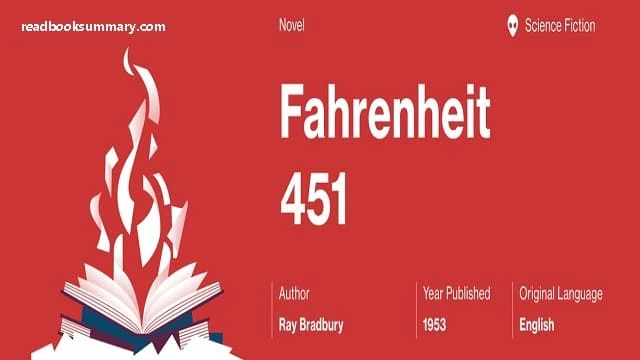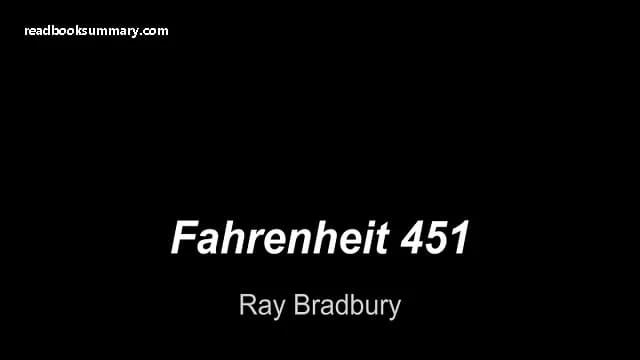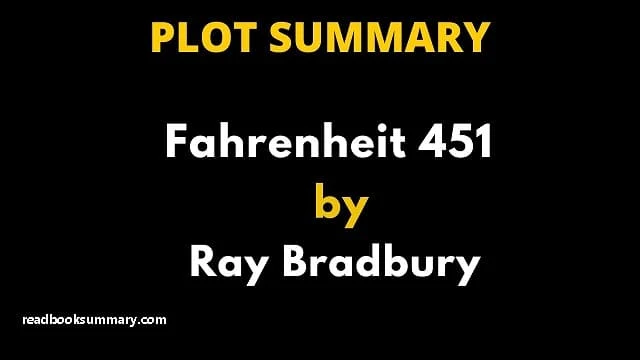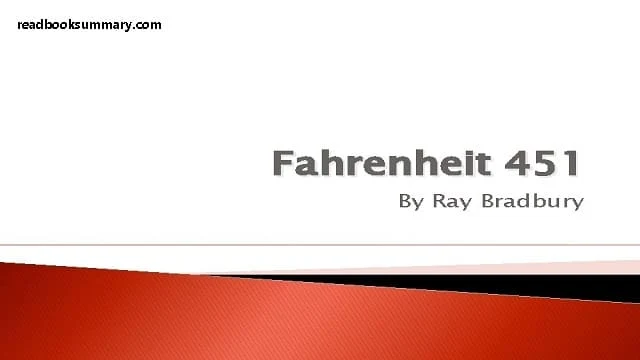Fahrenheit 451 Summary, it is a 1953 dystopian novel by American writer Ray Bradbury. It presents an American society where books have been personified and outlawed and "firemen" burn any that are found.
Fahrenheit 451 Book follows Guy Montag, a fireman who becomes disillusioned with his role of censoring literature and destroying knowledge, eventually quitting his job and committing himself to the preservation of literary and cultural writings.
 |
| Fahrenheit 451 Book Summary |
Fahrenheit 451 Summary
Told in the third person limited omniscient, Fahrenheit 451 tells the story of Guy Montag, a fireman whose job is to burn books in this dystopian world that suppresses creative expression in favor of mindless entertainment. Montag’s journey in this novel is both literal and spiritual, as he tries to unravel the mysterious power of books while evading the clutches of an authoritarian government, whose ill intentions are epitomized by Captain Beatty, Montag’s conniving employer.
At the novel’s opening, Montag is much like anyone else in this society, an unquestioning and fiercely loyal drone who takes simple pleasure from his work. A chance encounter with his 17-year-old neighbor, Clarisse McClellan, the antithesis of everything Montag stands for, forces him to begin questioning his life’s purpose.
He begins to realize that his marriage to his wife, Mildred, is meaningless and that they are both shallow and unhappy people—symbolized by Mildred’s implied suicide attempt. In the firehouse, Montag begins to openly question the nature of his work, which draws the attention of Captain Beatty, who takes an interest in Montag’s changing demeanor. The more time Montag spends with Clarisse, the more he realizes how empty the world is around him.
Things come to a head when the firemen are called out to an elderly lady’s home, a suspected book owner. The lady chooses to burn with her books rather than face arrest, and for Montag, who has already secretly stashed one of the contraband books under one arm, this is a pivotal moment in his transformation. He realizes that books must contain an enormous amount of power.
Back at home, Montag learns from Mildred that Clarisse is dead, which only adds to his despair. He asks Mildred to phone in sick to work for him, but before she can do so, Beatty pays Montag a home visit. Beatty lectures Montag on the true origins of firefighting and tries to justify why censorship is necessary. After he leaves, Montag reveals to Mildred that he has a secret stash of books. He asks her to help him begin to decipher them, but Mildred understands even less about books than Montag.
In Part 2, Montag recalls a chance encounter he had with a retired English professor the previous year. The man’s name was Faber, and Montag still has his contact details. He travels to Faber’s house to seek help and takes one of his stolen books with him—a Bible. The two hatch a plan to bring down the firemen system from the inside, and Montag arranges to bring Faber some money so they can pay a printer to print copies of books they can plant in fireman’s houses.
Faber gives Montag a secret listening device that will allow him to learn more about Beatty, their nemesis, back at the firehouse. Faber mentors Montag via the listening device, nourishing both his soul and his mind. Montag returns to work, and Beatty humiliates him in a one-sided verbal joust that attempts to highlight the hypocrisy of books. The firehouse alarm sounds, and the crew travels across the city in their fire truck to the scene of the crime—which turns out to be Montag’s house.
Part 3 opens with Beatty ordering Montag to destroy his own home, along with all the books inside. Mildred flees from the apartment, as she was the one who turned Montag in. Montag burns down his apartment but then turns his flamethrower on Beatty, killing the man instantly. Montag makes his dramatic escape, but a terrifying Mechanical Hound pursues him, and the hunt is transformed into a live TV event.
Montag escapes into the countryside and eventually meets up with a man called Granger, who leads a network of intellectuals who have perfected a technique that allows them to memorize whole books so they can go undetected. They plan to store the information until society is once again ready to read books. Montag realizes that he has managed to memorize sections of the Bible, which means he could be of use to the group. Shortly after, war breaks out as jet planes bomb the city below. Montag pictures Mildred’s death, and the men, having survived the blasts, turn back towards the city to search for survivors and begin anew.
You may also like to read: The Lord of the Rings Summary
 |
| fahrenheit 451 summary |
 |
| fahrenheit 451 part 1 summary |
 |
| fahrenheit 451 part 2 summary |
 |
| fahrenheit 451 part 3 summary |
 |
| fahrenheit 451 synopsis |
 |
| fahrenheit 451 short summary |
 |
| fahrenheit 451 plot summary |
Questions about Fahrenheit 451 Plot
What is the main point of Fahrenheit 451?
The overarching theme of Fahrenheit 451 explores the struggle between man's desire for knowledge and individuality in a society that expects ignorance and conformity.
What are the moral lessons of Fahrenheit 451?
Bradbury shows us how easily society can fall into a state of passive ignorance, blindly accepting the information we are given and the dangerous implications of doing so. The novel challenges us to never settle for the status quo and always seek the knowledge we need to continue growing as individuals.
What happens at 451 Fahrenheit?
The title page of the book explains the title as follows: Fahrenheit 451—The temperature at which book paper catches fire and burns.... On inquiring about the temperature at which paper would catch fire, Bradbury had been told that 451 °F (233 °C) was the autoignition temperature of paper.
Why was Fahrenheit 451 banned?
Bradbury's Fahrenheit 451 was banned several times in an effort to censor the graphic content of the story. Even though the story is about censorship, the novel has also been subject to censorship and banning.
Why is Fahrenheit 451 so popular?
Fahrenheit 451, dystopian novel, first published in 1953, that is regarded as perhaps the greatest work by American author Ray Bradbury and has been praised for its stance against censorship and its defense of literature as necessary both to the humanity of individuals and to civilization.
What are the 3 things in Fahrenheit 451?
Faber states that a world without books is missing three crucial elements: quality information, the time people need to process that information, and the ability to freely act on what they have learned.
What happens at the end of Fahrenheit 451?
The novel ends with Montag escaping the city in the midst of a new declaration of war. Once he's deep in the country, Montag meets a band of roving intellectuals who have elected to preserve significant works of literature in their memory.
Is the ending of Fahrenheit 451 happy or sad?
Montag feels many things at the end of Fahrenheit 451. He is happy that he made it out of the city and that he found like-minded people. He is sad that his wife was in the city when it was bombed, and he is scared that Faber didn't make it out in time. He feels hopeful for the future.
Why is Fahrenheit 451 a scary society?
"Society" in Fahrenheit 451 controls the people through media, overpopulation, and censorship. The individual is not accepted, and the intellectual is considered an outlaw. Television has replaced the common perception of family. The fireman is now a burner of books rather than a protector against fire.
How does Fahrenheit 451 affect society?
The society in Fahrenheit 451 is a dystopian society in which books are banned and the firemen are responsible for burning any that are found. The censoring of books and other media has had a profound effect on the people in this society, leading to a lack of knowledge, curiosity and creativity.
Why is Fahrenheit 451 so confusing to read?
I've realized that this book is much, much harder to read than other books because of the sheer amount of metaphors in the book and my perfectionist ideology to read and understand (or try to understand) them all. I use a simple rule with reading
Is Fahrenheit 451 a utopia or dystopia?
Fahrenheit 451 is an example of dystopian fiction, which is a subgenre of science fiction that depicts a negative vision of the future.
Why did Bradbury write Fahrenheit 451?
“I am a preventer of futures, not a predictor of them. I wrote Fahrenheit 451 to prevent book-burnings, not to induce that future into happening, or even to say that it was inevitable.” Ray Bradbury was a lover of books and libraries.
What is the difference between 1984 and Fahrenheit 451?
Apart from anything else, 1984 can also be considered a sort of satirical romance, whereas Fahrenheit 451 has no real element of romance whatsoever. It involves an inner conflict and occasionally uses Montag's wife as a McGuffin, while in 1984 Julia's relationship is the act of rebellion in itself.








